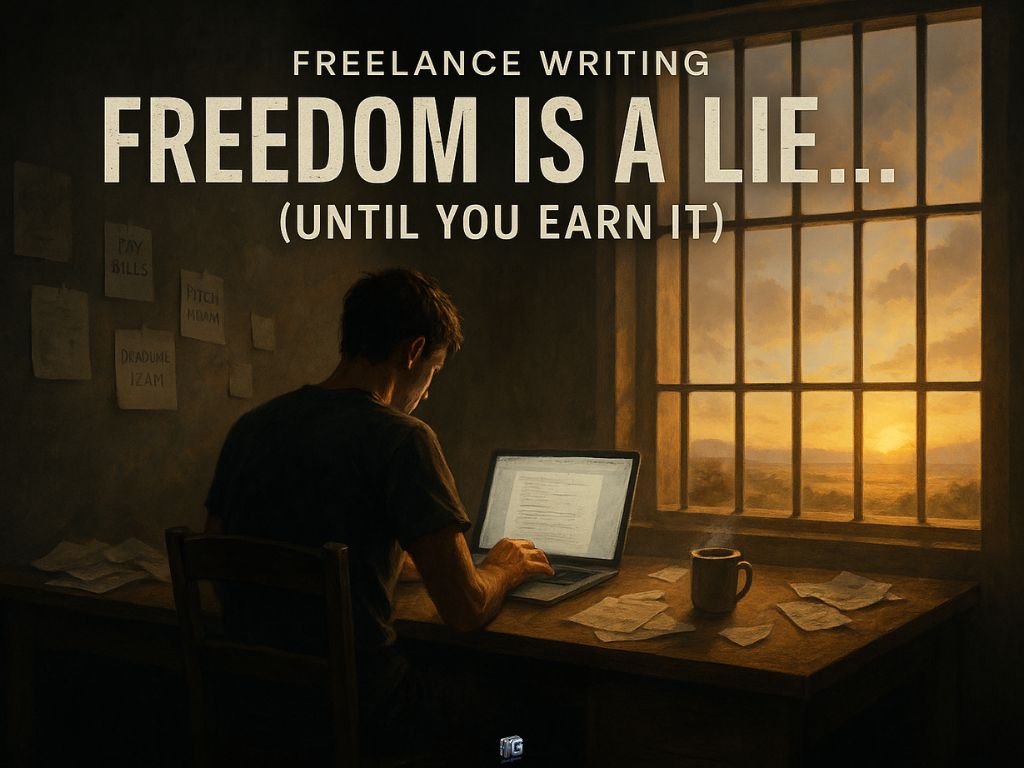Introduction: What Is Freelance Writing (And Who Is It For?)
Freelance writing is more than just putting words on a page for money. It’s a flexible career where you use your writing skills to help clients with everything from blog posts to marketing materials, often from the comfort of your own home.
You’re in charge. You choose your clients, your hours, and your income goals. Some writers treat it as a side hustle, others build it into a full-time business.
But freelance writing isn’t a one-size-fits-all path. If you’re looking for predictable paychecks and a strict routine, you may find it challenging at first. The rewards can be big but they come with uncertainty, deadlines, and a learning curve.
Who tends to thrive? People who are self-motivated, comfortable working independently, and willing to keep learning. Writers who enjoy variety, want more control over their schedules, and aren’t afraid to reach out to new clients often do well.
If you’re excited by the idea of using your words to make a real impact and you’re open to new experiences, freelance writing could be the right fit for you.
Key Takeaways
Freelance Writing in 2025
- Freelance writing is a flexible career for anyone willing to learn, adapt, and put in real effort — not just seasoned professionals.
- Building a portfolio with self-made samples is your fastest path to real clients; no need to wait for “permission” to get started.
- Picking a niche (or testing a few) helps you stand out and find work that pays better and feels more rewarding.
- The benefits are big: more control, freedom to choose clients, and income potential limited only by ambition.
- The challenges are real: uncertainty, rejection, deadlines, and business skills but all can be managed with the right approach.
- Taking action consistently writing, pitching, and improving is what separates successful freelancers from those who just dream about it.
Disclaimer: I am an independent Affiliate. The opinions expressed here are my own and are not official statements. If you follow a link and make a purchase, I may earn a commission.

The Real Benefits of Freelance Writing (And the Ugly Truths)
Freelance writing is packed with upsides there’s a reason so many people want in. Flexibility is the headline benefit. You can set your own schedule, work from anywhere, and choose the projects that truly interest you. If you’re balancing family, travel, or another job, freelance writing lets you fit work around your life, not the other way around.
Control is another huge win. You decide which clients to work with, what topics to write about, and even how much you want to earn. As your skills grow, so can your rates.
Income potential? There’s no ceiling; some writers earn a little extra on the side, while others build six-figure businesses. Your ambition, your effort, and your strategy determine your outcome.
But let’s be real: it’s not all coffee shops and creativity. The freedom comes with responsibility. Some months are busier than others, and income can be unpredictable at first. You’ll face deadlines, revisions, and sometimes, demanding clients. Getting paid is rewarding but it takes hustle, discipline, and the willingness to keep improving.
Freelance writing offers real rewards but only if you’re prepared to work for them. The writers who stick with it, adapt, and keep learning are the ones who see the biggest benefits.
Is Freelance Writing Right For You? [Quick Quiz & Checklist]
Not sure if freelance writing fits your goals or your personality? Use this simple checklist to see if you’re ready or what you might need to work on.
Ask yourself:
- Do I enjoy writing and learning about new topics?
- Am I comfortable working alone and managing my own time?
- Can I handle uncertainty like changes in workload or clients who take time to pay?
- Am I willing to pitch myself, handle feedback, and sometimes face rejection?
- Do I want more control over my schedule and income, even if it means less security at first?
- Am I open to building new skills, learning about business, and adapting to different clients’ needs?
Scoring:
- If you answered “yes” to most of these, you’re likely a good fit for freelance writing.
- If you answered “no” to several, it’s not a dealbreaker but you may want to start slow, learn the basics, or consider another writing path that offers more structure.
The most successful freelance writers aren’t perfect, they’re just willing to keep going, even when things get tough.ore than your vocabulary ever will be. Master marketing, or master the art of waiting… broke.

How To Start Freelance Writing (Step-By-Step For Beginners)
Starting out can feel overwhelming, but the path to freelance writing is clearer than you think.
Here’s a straightforward way to begin: no fluff, just action steps you can use today.
1. Pick Your Niche (or Start Broad): Choose topics you enjoy or know well. Don’t stress about picking the “perfect” niche right away. It’s fine to experiment as you gain experience.
2. Build Simple Writing Samples: You don’t need published work to get started. Write a few example blog posts, articles, or even product descriptions related to your chosen topics. Aim for 3–5 solid samples.
3. Create a Basic Portfolio: Use a free website builder (like WordPress, Wix, or even a Google Doc) to showcase your samples. Make it easy for clients to see what you can do.
4. Find Your First Gigs: Sign up for trusted freelance platforms like Upwork, Fiverr, or ProBlogger. Apply to entry-level projects that match your samples. Don’t overthink your first pitches, focus on clarity, politeness, and showing you understand what the client wants.
5. Set Up Simple Systems: Track your pitches, assignments, and payments in a spreadsheet or notebook. This keeps you organized and helps you spot what’s working.
6. Keep Improving: Ask for feedback, keep writing, and learn from each project. Every assignment (even a small one) builds skill and confidence.
The hardest part is starting. Take the first step, learn as you go, and remember: every pro was a beginner once.

Advanced Strategies to Level Up Your Freelance Writing Career
Once you’ve landed your first clients and built a basic portfolio, it’s time to think bigger.
Here’s how to turn freelance writing from a side hustle into a thriving business:
1. Specialize and Find Your Niche: Look for industries or topics where you enjoy the work and where clients pay well. Health, tech, finance, marketing, and SaaS (software) are all strong options. Specializing helps you stand out and justify higher rates.
2. Build Your Personal Brand: Create a simple, professional website (even a single page is fine) with your bio, portfolio, and contact info. Share insights or samples on LinkedIn or Medium to show you’re active in your field. Over time, your name can become a magnet for better clients.
3. Raise Your Rates Strategically: As you gain experience and deliver results, don’t be afraid to increase your prices. Research what others charge in your niche and test new rates with new clients.
4. Streamline Your Workflow: Use tools to automate invoices, contracts, and client onboarding. Templates for pitches, proposals, and follow-ups can save hours each month and make you look more professional.
5. Attract Clients, Don’t Just Chase Them: Ask happy clients for testimonials and referrals. Publish guest posts, answer questions in writing forums, or share helpful tips on social media. The more visible you are, the more clients will come to you.
6. Keep Learning: The best freelance writers stay curious about both writing and business. Take courses, study successful peers, and learn about content strategy, SEO, or copywriting to offer more value.
Growth isn’t just about writing more, it’s about thinking like a business owner and building systems that support you as you level up.

The Real-Life Challenges of Freelance Writing (And How To Survive Them)
Every freelance writer faces obstacles no matter how polished their portfolio looks on the outside. If you’re feeling anxious, insecure, or overwhelmed, you’re not alone.
Here’s what most new (and even experienced) writers struggle with and how to push through:
1. Dealing with Uncertainty: Freelancing means your workload and income might go up and down. The fix? Build a buffer. Save a little from every project, and keep applying for new gigs even when you’re busy.
2. Facing Rejection or Being Ghosted: Not every pitch gets a reply. Some clients disappear without warning. Instead of taking it personally, treat every “no” as practice and keep moving forward. The right client will say yes.
3. Battling Self-Doubt: Imposter syndrome is real. The cure? Focus on what you can control: keep improving, accept that nobody writes perfectly the first time, and celebrate small wins.
4. Staying Productive (and Avoiding Burnout): Working from home can blur the lines between “work” and “life.” Set a schedule, take breaks, and remember you don’t have to say yes to every project. Protect your energy so you can do your best work.
5. Navigating Difficult Clients: Sometimes you’ll meet clients who demand too much, change direction constantly, or pay late. Set clear expectations, ask for deposits, and don’t be afraid to walk away from a bad fit.
6. Handling Competition: There are plenty of freelance writers out there. What sets you apart is reliability, good communication, and always delivering what you promise. Professionalism matters as much as talent.
Everyone struggles at some point. What separates successful freelancers is their willingness to learn, adapt, and keep going especially when things get tough.

The Brutal Trade-Offs of Freelance Writing
| Aspect | Benefits (The Good) | Challenges (The Dark Side) | Tips to Handle It |
|---|---|---|---|
| Flexibility | Work from anywhere, set your own hours, choose projects you love | Blurred boundaries, risk of burnout if you’re not disciplined | Create a routine, set work hours, take breaks |
| Income Potential | No ceiling; side hustle or full-time six-figure career possible | Unpredictable income, slow months, late payments | Build savings buffer, diversify clients, use contracts & deposits |
| Control | Choose your clients, niche, and workload | Constant pitching, rejection, and ghosting | Keep a pitch tracker, send consistent proposals, don’t take rejection personally |
| Growth | Learn new topics, build authority, raise rates over time | Competition is fierce, imposter syndrome hits hard | Specialize in a niche, keep improving, focus on professionalism |

Freelance Writer vs Writing Entrepreneur: Which Path Are You On?
| Freelance Writer | Writing Entrepreneur |
|---|---|
| Works project by project, often at the mercy of client demand | Builds systems, products, and recurring revenue streams |
| Focuses mainly on writing for others | Uses writing to create assets: blogs, courses, newsletters, books |
| Income tied directly to hours worked | Income scales through leverage, teams, and automation |
| Chases clients and pitches constantly | Attracts clients through brand, authority, and inbound demand |
| Thinks like a contractor | Thinks like a business owner and investor |
A lot of freelancers start with platforms like Fiverr or Upwork, and that’s a solid path. The funny thing is, I set up my accounts there but never actually worked on them. What I didn’t realize at the time was that I was already freelancing in my own way.
Every time I published a blog post and I’ve written more than a hundred across different sites I was basically my own client. And that gave me a lesson most platforms can’t teach: when you choose your customer, you choose your future.
For me, that meant ranking my own content in search engines, testing my writing in the real world, and enjoying the wild ride of building something on my own.
Ismel Guerrero.
Next: Discover profitable writing side hustles to jumpstart your career.

Conclusion: Ready To Take Action?
Reading about freelance writing is a good start but results only come when you take that first step.
Pick one action today:
- Write a sample and start your portfolio
- Sign up on a freelance platform
- Pitch your first client
- Join a writing community or forum
You don’t have to be perfect to get paid, you just have to begin.
Every successful freelance writer started exactly where you are now: unsure, curious, and maybe a little nervous. The difference? They didn’t stop at reading, they took action.
Are you ready to take yours? writing, perceived competence is competence. And you control that perception from day one.
Make sure to check out our freelance digital marketing guide if you’re ready to grow beyond writing.

Frequently Asked Questions About Freelance Writing
How do I start freelance writing if I have no experience?
Begin by creating your own writing samples, blog posts, articles, or even product descriptions. Use these to build a simple portfolio. Start applying for entry-level gigs on trusted platforms. Every project builds skill and credibility.
How much can freelance writers really earn?
Income varies widely. Many beginners earn a few hundred dollars a month, while experienced writers in specialized niches can make $3,000–$10,000+ per month. Your earnings depend on your skills, your niche, and your willingness to pitch and negotiate.
What’s the biggest challenge for new freelance writers?
Finding clients and handling uncertainty. Persistence is key, apply consistently, learn from every pitch, and keep refining your samples.
How do I know what to charge?
Research average rates in your niche. Start with competitive pricing, then raise your rates as you gain experience and positive feedback. Remember: quality work deserves fair pay.
Is freelance writing still worth it with AI tools like ChatGPT?
Yes, for writers who focus on original ideas, strategic thinking, and authentic storytelling. AI can help with research or drafts, but clients still want a human voice and unique perspective.
Do I need to register a business or pay taxes as a freelance writer?
That depends on your location and income level. In most places, you’ll need to track your earnings and pay taxes. Research local requirements or consult a tax professional if you’re unsure.
Can freelance writing become a full-time career?
Absolutely. Many writers start part-time and grow into a full-time business as their skills and client base expand.
2 Comments
Freelance Digital Marketing: How to Start & Succeed in 2025 - Ismel Guerrero. · April 28, 2025 at 7:11 pm
[…] out our Freelance Writing Guide for a full breakdown of what it really takes to […]
Writing Side Hustles: Profitable Ideas to Earn in 2025 - Ismel Guerrero. · April 28, 2025 at 7:17 pm
[…] our Freelance Writing Guide if you’re building your foundation as a […]